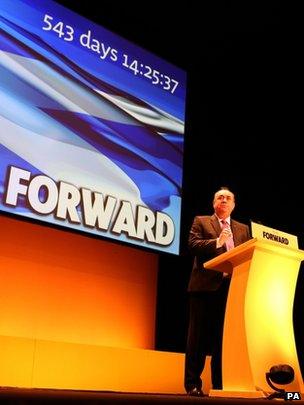A message of continuity
- Published

Alex Salmond spoke to his party's conference in Inverness
Alex Salmond's opponents, understandably from their perspective, seek to present independence as divisive, as breaking up a successful union, as fragmentation, as a dangerous departure.
Alex Salmond, equally understandably, seeks to project independence in terms of continuity, of calm, sensible advance.
There was much of that continuity message on display in the First Minister's speech to the SNP conference here in Inverness. For one thing, he deliberately summoned up proclaimed gains under devolution as a whole, not just under SNP control.
Yes, he mentioned the introduction of free university tuition. But, in the same sentence, he talked of free personal care - which was brought into being by Labour and the Liberal Democrats.
The objective is to argue that independence is part of a continuum, that it builds upon what has gone before. That is, of course, a philosophical counterpoise to the stance adopted by supporters of the Union - and quite deliberately so.
Then there is a further dimension to continuity. That is to depict Scotland, now and previously, as being at the whim of unwelcome policies driven by Westminster, driven especially by UK governments which lack majority support north of the Border.
So, it is no accident that Mr Salmond's speech featured a mention of the Poll Tax" from 20 years back, as well as the "bedroom tax" which is due to be implemented shortly. (Or should I say the Community Charge and Under Occupancy benefit penalty.)
The First Minister announced that all SNP councils will follow the example of Dundee and avoid the threat of evictions for those struggling to pay as a consequence of financial losses from the new penalty.
To be clear, the scope of this is relatively limited. It does not mean that every tenant falling into arrears will be protected - only those whose difficulties can be traced, discernibly, to loss of benefit because of under occupancy.
Old-style zeal
However, just as with the SNP non-payment campaign in response to the Poll Tax, the objective, politically as distinct from pragmatically, is to be seen as standing up for the interests of hard-pressed Scots against an initiative which can be depicted as a Westminster predation.
As a sidebar, of course, the SNP will seek to depict their party - and thus independence - as offering protection from such policies (and from other matters, such as Trident) which, they assert, would not be on offer from their principal opponents, Labour.
Another thought, dealing with tone. There was relatively little oratorical zest from Mr Salmond, an absence of bombast. This, again, was deliberate.
Mr Salmond knows that the delegates in the Eden Court would have roared, full throated, in response to a little old-style zeal. But he also knows that such rhetoric may tend to deter others; those who are not signed-up Nationalists.
You know, the people he needs to convince if he is to win the referendum. Women voters, perhaps especially. In which context, we might mention the stress on family, the promise of an effort to enhance childcare still further - with the economic levers of independence.
Hence, the speech was - as one of Mr Salmond's Cabinet colleagues suggested to me - a "conversation with the nation", rather than just the customary conference rallying speech.